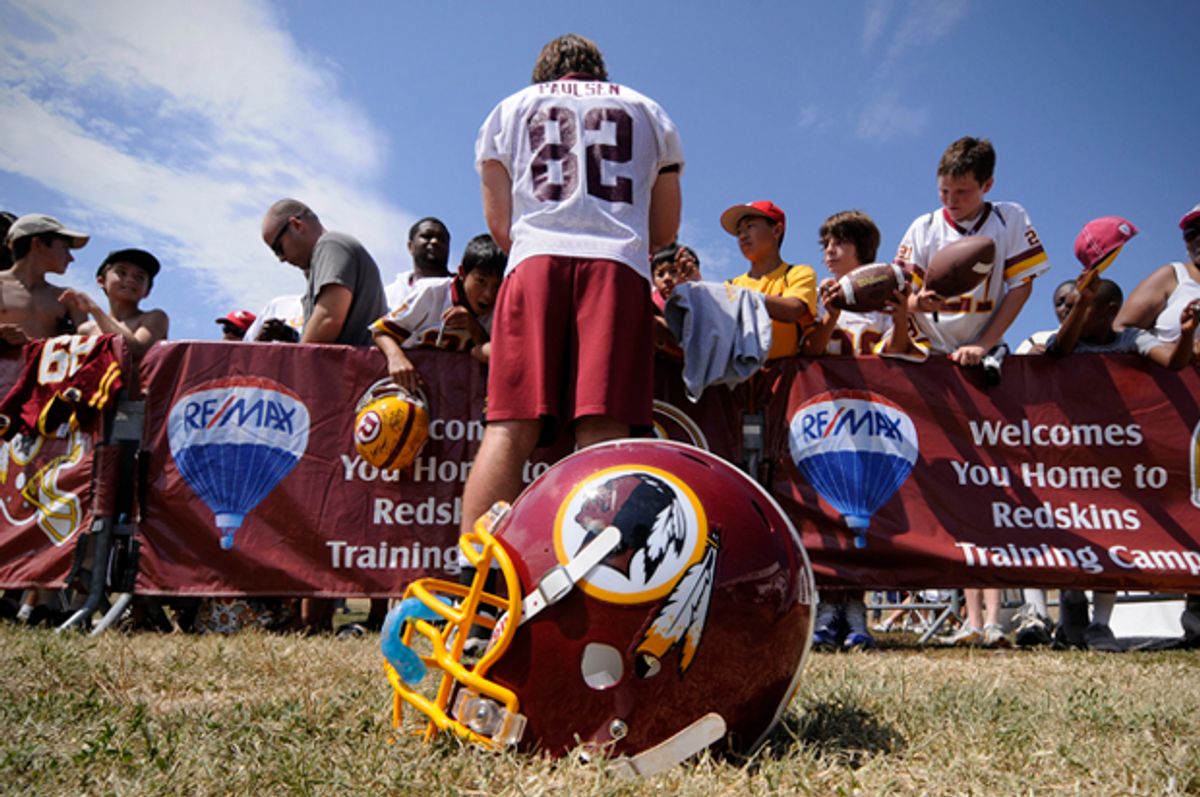In what will likely be remembered as the beginning of the end of the most hotly debated and dearly clung to team name in all of professional sports, on Wednesday morning the U.S. Patent Office Trademark Trial and Appeal Board made the historic ruling that the Washington Redskins' nomenclature is "disparaging to Native Americans" and canceled six federal trademark registrations.
As USA Today notes, the Trademark Trial and Appeal Board issued a similar ruling 15 years ago – one that was overturned in 2003. And during its current appeal, the team may go on using its familiar name. On Wednesday, the Redskins issued a grumpy statement that "We’ve seen this story before. And just like last time, today’s ruling will have no effect at all on the team’s ownership of and right to use the Redskins name and logo … This ruling – which of course we will appeal – simply addresses the team’s federal trademark registrations, and the team will continue to own and be able to protect its marks without the registrations. The registrations will remain effective while the case is on appeal."
But a lot has changed since we saw this story before, gentlemen. A lot has changed even since a year ago, when the team owner Daniel Snyder swore he would never – "and you can use caps" – ever change the name. The Wednesday ruling is the result of an eight-year newer battle – one that has gained far more support and deeper understanding of federal trademark law forbidding trademarks that "may disparage" individuals and groups or "bring them into contempt or disrepute." It's a battle that President Obama himself made his stance on clear when he declared last October, "If I were the owner of the team and I knew that there was a name of my team — even if it had a storied history — that was offending a sizable group of people, I’d think about changing it." It's one that has prompted several news sites to make the choice to refuse to use the current team name.
Last fall, Snyder issued an impassioned rebuttal to the increasing demand for change, noting that "an April 2013 AP poll showed that eight out of ten of all Americans in a national sample don't think the Washington Redskins name should be changed" and explaining, "We do not intend to disparage or disrespect a racial or ethnic group. The name 'Washington Redskins' is 80 years old -- it's our history and legacy and tradition. We Redskins fans sing 'hail to the Redskins' every Sunday as an expression of honor not disparagement." That's no doubt why, as part of its honor-driven 80-year history, the team has in its past featured cheerleaders rain dancing in black braids and a fight song that included the lyrics, "Scalp ’em, swamp ’um. We will take ’um big score." It also holds the distinction of being the last NFL team to be racially integrated.
The team's history aside, there's a far bigger issue at hand this time. Ultimately, what's right is what's right and the time for what's right to prevail is upon us. It doesn’t matter what eight out of 10 Americans say. It doesn't matter if, as the AP pointed out last fall, "There are Native American schools that call their teams Redskins. The term is used affectionately by some natives, similar to the way the N-word is used by some African-Americans." It doesn't matter any more than it does that you can drum up a few models who say that, why no, they didn't feel at all exploited by a controversial photographer, because that doesn't mean the people who say otherwise are wrong. That there is no universal agreement about many things that are inappropriate is not a negation of either their inappropriateness or the experience of those who are genuinely hurt and offended by them.
On Wednesday, Suzan Harjo, the 69-year-old activist who has been leading the fight against the Redskins' name since 1992, explained to Business Insider "what objectification is: You strip the person of humanity and they're just an object and you can do anything." And that's what the word "Redskins" is. That's what it means. That's why it's a no-brainer that it has no place representing a 21st century team. You can fight the inevitability known as intellectual enlightenment and social progress all you want, hiding behind meaningless concepts like tradition (see also: the absurd and futile fight against marriage equality) and history, but those are truly dumb – and crazy costly -- battles to get into. If your argument against change boils down to, "This is how it's always been and we don't have a problem with that and I don't know, it's haaaaaard to change all the hats and stuff," you're going down, plain and simple. For evidence, I refer you to all of human history.



Shares